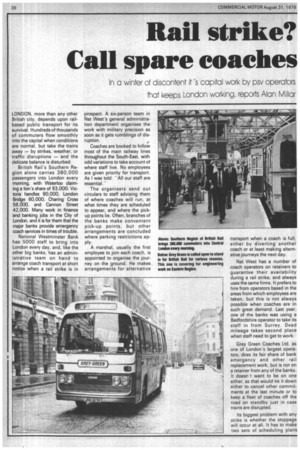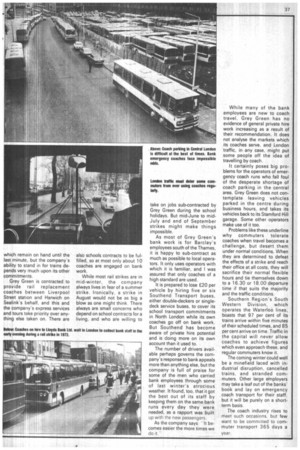Rail strike?
Page 38

Page 39

If you've noticed an error in this article please click here to report it so we can fix it.
Call spare coaches
In a winter of discontent it's capital work by psv operators that keeps London working, reports Alan Millar
LONDON, more than any other British city, depends upon railbased public transport for its survival. Hundreds of thousands of commuters flow smoothly into the capital when conditions are normal, but take the trains away — by strikes, weather, or traffic disruptions — and the delicate balance is disturbed.
British Rail's Southern Region alone carries 380,000 passengers into London every morning, with Waterloo claiming a lion's share of 93,000. Victoria handles 90,000, London Bridge 60,000, Charing Cross 56,000, and Cannon Street 42,000. Many work in finance and banking jobs in the City of London, and it is for them that the major banks provide emergency coach services in times of trouble.
National Westminster Bank has 5000 staff to bring into London every day, and, like the other big banks, has an administrative team on hand to arrange coach transport at short notice when a rail strike is in prospect. A six-person team in Nat West's general administration department organises the work with military precision as soon as it gets rumblings of disruption.
Coaches are booked to follow most of the main railway lines throughout the South-East, with odd variations to take account of where staff live. No employees are given priority for transport. As I was told "All our staff are essential."
The organisers send out circulars to staff advising them of where coaches will run, at what times they are scheduled to appear, and where the pickup points lie. Often, branches of the banks make convenient pick-up points, but other arrangements are concluded where parking restrictions ap ply.
A marshal, usually the first employee to join each coach, is appointed to organise the journey on the ground. He makes arrangements for alternative transport when a coach is full, either by diverting another coach or at least making alternative journeys the next day.
Nat West has a number of coach operators on retainers to guarantee their availability during a rail strike, and always uses the same firms. It prefers to hire from operators based in the areas from which employees are taken, but this is not always possible when coaches are in such great demand. Last year, one of the banks was using a Bedfordshire operator to take its staff in from Surrey. Dead mileage takes second place when staff need to get to work.
Grey Green Coaches Ltd, as one of London's largest operators, does its fair share of bank emergency and other rail replacement work, but is not on a retainer from any of the banks. It doesn't want to be on one either, as that would tie it down either to cancel other commitments at the last minute or to keep a fleet of coaches off the road on standby just in case trains are disrupted.
Its biggest problem with any strike is whether the stoppage will occur at all. It has to make two sets of scheduling plans which remain on hand until the last minute, but the company's ability to stand in for trains depends very much upon its other commitments.
Grey Green is contracted to provide rail replacement coaches between Liverpool Street station and Harwich on Sealink's behalf, and this and the company's express services and tours take priority over anything else taken on. There are also schools contracts to be fulfilled, so at most only about 10 coaches are engaged on bank work.
While most rail strikes are in mid-winter, the company always lives in fear of a summer strike. Ironically, a strike in August would not be as big a blow as one might think There always are small concerns who depend on school contracts for a living, and who are willing to take on jobs sub-contracted by Grey Green during the school holidays. But mid-June to midJuly and end of September strikes might make things impossible.
As most of Grey Green's bank work is for Barclay's employees south of the Thames, it is happy to sub-contract as much as possible to local operators. It only uses operators with which it is familiar, and I was assured that only coaches of a high standard are used.
It is prepared to lose £20 per vehicle by hiring five or six Southend Transport buses, either double-deckers or singledeck service buses, to cover its school transport commitments in North London while its own coaches go off on bank work. But Southend has become aware of private hire potential and is doing more on its own account than it used to.
The number of drivers available perhaps governs the company's response to bank appeals more than anything else, but the company is full of praise for some of the men who carried bank employees through some of last winter's atrocious weather. It found, too, that it got the best out of its staff by keeping them on the same bank runs every day they were needed, as a rapport was built up with the new passengers.
As the company says. "It becomes easier the more times we do it." While many of the bank employees are new to coach travel, Grey Green has no evidence of general private hire work increasing as a result of their recommendation. It does not analyse the markets which its coaches serve, and London traffic, in any case, might put some people off the idea of travelling by coach.
It certainly poses big problems for the operators of emergency coach runs who fall foul of the desperate shortage of coach parking in the central area. Grey Green does not contemplate leaving vehicles parked in the centre during business hours, and takes its vehicles back to its Stamford Hill garage. Some other operators make use of it too.
Problems like these underline why commuters tolerate coaches when travel becomes a challenge, but desert them under normal conditions. When they are determined to defeat the effects of a strike and reach their office at all costs, they will sacrifice their normal flexible hours and tie themselves down to a 16.30 or 18.00 departure time if that suits the majority and the traffic conditions.
Southern Region's South Western Division, which operates the Waterloo lines, boasts that 97 per cent of its trains arrive within five minutes of their scheduled times, and 85 percent arrive on time. Traffic in the capital will never allow coaches to achieve figures which even approach these, and regular commuters know it.
The coming winter could well be a minefield laced with industrial disruption, cancelled trains, and stranded commuters. Other large employers may take a leaf out of the banks' book and lay on emergency coach transport for their staff, but it will be purely on a shortterm basis.
The coach industry rises to meet such occasions, but few want to be committed to commuter transport 365 days a year.




































































































